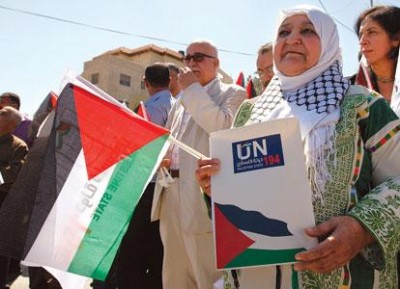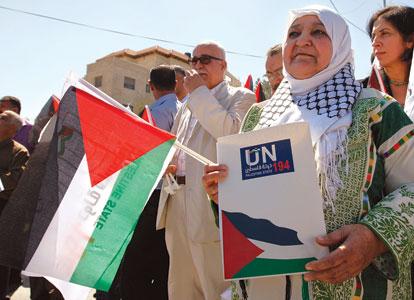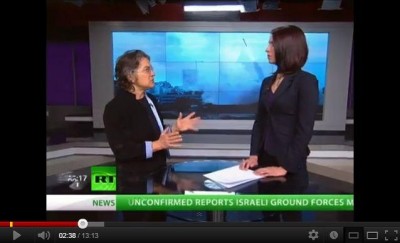The ceasefire in Gaza gave us all something extra to be grateful for over the Thanksgiving holiday. So far the ceasefire holds – at least on the Palestinian side. The Israeli military violated it just 36 hours after it went into effect, when soldiers shot at Palestinian farmers walking across their land near the Israeli-installed border fence, killing one and injuring twenty others. The Hamas government in Gaza treated it seriously, reporting it to Egypt as the guarantor of the ceasefire but significantly not responding in kind.

Once again, Palestinians paid the human price for Israeli occupation
So the truce holds. But it remains very fragile. And the killing of Anwar Abdelhadi Quiedh provides a clear reminder of just what the Gaza crisis is all about: occupation. Quiedh was part of a group of Palestinian farmers who walked out to their own fields on Gazan land which Israel had declared a “no-go” zone about a kilometer wide along the border. For years Israeli soldiers had turned it into a shoot-to-kill zone under their own control.
The terms of the November 21st ceasefire included specific language restoring the rights of Palestinians in Gaza to their land; it called for “refraining from restricting residents’ free movement, and targeting residents in border areas.” Israel was obligated to honor that “after 24 hours from the start of the ceasefire.” But somehow, Israel apparently didn’t view itself as obligated to honor it at all. So Anwar Abdelhadi Quiedh and twenty other Palestinian farmers who walked out to their fields after hearing the news that they would be able to till their land for the first time in more than seven years, paid the human price.
Once again, Palestinians paid that human price for Israeli occupation. And once again, Israel felt no obligation to implement the terms of the ceasefire on its own – for the usual reason: the U.S. had not demanded that it do so. As I described in an interview on The Real News, until Washington says differently, Israel can count on its absolute protection. Until Washington says differently, there’s no reason for Israel to feel obligated to abide by any ceasefire, treaty, international law or UN resolution – because the U.S. has got its back.
THE U.S. AT THE CENTER
The U.S. role was, of course, central in the Gaza crisis. Israel’s defense minister, Ehud Barak, said “this effort could not have been concluded without the generous and consistent support of the American administration led by President Obama.” Prime Minister Netanyahu, facing reelection in January, presumably calculated that the Gaza escalation would compel Obama to publicly reassert uncritical backing of every Israeli move, regardless of Tel Aviv’s violations of international humanitarian law, UN resolutions, the Geneva Conventions or anything else. I elaborate on the influence of the upcoming Israeli elections as well as root causes of the crisis in a television interview on RT.
And, as was true during Israel’s Operation Cast Lead in Gaza back in 2008-09, every time someone in Gaza took the chance to look out their window during a brief lull in Israel’s bombing, they saw the Israeli pilots flying US-made and US-taxpayer-funded F-16 warplanes and Apache war helicopters. Once again, US taxpayers and our government are directly complicit, as I discuss in this recent article in The Nation.
THE NEW MIDDLE EAST
There was, though, a profound difference this time around. This is no longer the Middle East of 2008-09, when Tel Aviv could count on US-backed dictators to keep their angry populations under control and prevent any outbursts against Israel, when Israel could rely on a compliant Egyptian government to keep the Rafah crossing shut to keep besieged Gaza entirely locked down, when the Israel Defense Forces knew they could depend on the Syrian government to keep the occupied Golan Heights and the Israel-Syria border quiet and secure. On a special episode of Al-Jazeera’s Inside Story Americas, I was part of a panel discussing the U.S. media coverage of the Gaza assault and how it differed from earlier crises – the discourse is changing.

A Palestinian man cleans up after a UN food distribution center was badly damaged in an Israeli airstrike on Jabalia refugee camp in the northern Gaza Strip. Photo by APA.
And conditions on the ground are changing too. This time it was Israel that was –and remains – the isolated player in the region. Ten different prime ministers and foreign ministers visited Gaza City to express solidarity during the Israeli bombing. They were led by Egypt and Turkey, two of the countries Hamas is most closely tied to now that it has cut its ties to Syria and significantly downgraded its ties with Iran. Ironically, those are the same two countries the U.S. is desperately seeking to shore up alliances with in the new post-Arab Spring Middle East. And Hamas gained new credibility both within Gaza and among Palestinians elsewhere, in other parts of the occupied territory, the West Bank and East Jerusalem, as well as inside Israel and among the far-flung diaspora of Palestinian exiles and refugees. I discussed regional states’ changing relationships with Hamas on Democracy Now last week.
Egyptian President Mohamed Morsi played the central role in ceasefire negotiations. After sending his prime minister to express solidarity with Palestinians in Gaza during the bombing, he emerged as a relatively even-handed negotiator leading to widespread U.S. and other Western praise for his “pragmatism.” It is clear that the timing of his next move, the announcement of a wide-ranging decree seizing for himself a whole host of governmental powers, was chosen to take advantage of his ceasefire-driven popularity. That move, which among other things calls for an end to judicial oversight of anything he does until Egypt’s new, still work-in-process constitution is finished, led to massive street protests from secular, Christian, other non-Islamist and even some Islamists concerned about the concentration of power. Morsi and his party have pulled back somewhat from the original power-grab, but the move made clear once again just how complicated the one-step-forward-two-steps-back process of building a truly Egyptian democracy is going to be.
THE UN: PALESTINE BIDS FOR STATEHOOD
The United Nations, once again, was largely irrelevant this time around. Secretary-General Ban ki-Moon went to the region to help build support for the ceasefire, but he played little role in the actual negotiations. Once the ceasefire was in place, UN attention shifted to the vote on Palestine’s statehood bid scheduled for November 29th.

The vote on the Palestinian resolution is scheduled for late afternoon on November 29th, the UN’s International Day of Solidarity with the Palestinian People.
That General Assembly decision, whose trajectory 24 hours before the vote is decidedly moving in favor of an overwhelming Palestinian victory, will recognize Palestine as a “non-member” or observer State. That would be an enhanced status compared to its current position of a “non-member entity.” The new status would change little at the UN itself; Palestine would still not be a member, could not vote, would still have to rely on the Arab Group to introduce resolutions in the Assembly or the Security Council. But recognition from the UN that Palestine is indeed a state regardless of UN membership would help set the stage for joining other international organizations and signing treaties.
The U.S. Campaign to End the Israeli Occupation organized a telephone teach-in on the statehood bid a couple of weeks ago. Omar Dajani and I talked and answered questions about what the UN move might mean and what role the U.S. is playing in trying to prevent it. You can find the audio of the teach-in here.
The most important move would be a decision for Palestine to join the International Criminal Court by becoming a new signatory to the Rome Treaty. That would, in theory, allow the new ICC member state to request the prosecutor to indict Israel on war crimes charges for violations committed in Palestinian territory – which includes Gaza. Nothing is guaranteed; of course, it’s all about political will. But we had a good indication of the potential value of Palestine joining the Court. The one “softening” proposal the U.S. and Israel were reportedly urging on the Palestinians if they insisted on going ahead with the statehood bid, was a promise that they would not use the new statehood status to join the International Criminal Court. Kind of a nice recognition that even the U.S. and Israel are worrying about the potential culpability of Israeli officials (and potentially their U.S. paymasters) in an international jurisdiction.
The vote on the Palestinian resolution is scheduled for late afternoon on November 29th, the UN’s International Day of Solidarity with the Palestinian People, and the General Assembly will hold a solemn commemoration in the morning. One of the speakers, representing the jury of the Russell Tribunal on Palestine on behalf of global civil society, will be Roger Waters, the Palestinian human rights activist and great musician from Pink Floyd. His speech to the diplomats of the General Assembly will be a great tool for civil society activists – it will be livestreamed from the UN at http://webtv.un.org.
AND BEYOND…
There’s lots going on beyond Palestine, of course. Crucial developments on Afghanistan (including plans for a long-term U.S. military deployment after 2014), war spending and military cuts in the context of the fiscal-cliff-that-isn’t debates, protests against the bloated military budget and drone warfare, a C-Span Washington Journal interview I did on U.S. troop deployments around the world, and lots more. So more later.
For now, I hope you had a wonderful holiday, with family and friends and lots to be thankful for.
But we still have a lot of work to do.

